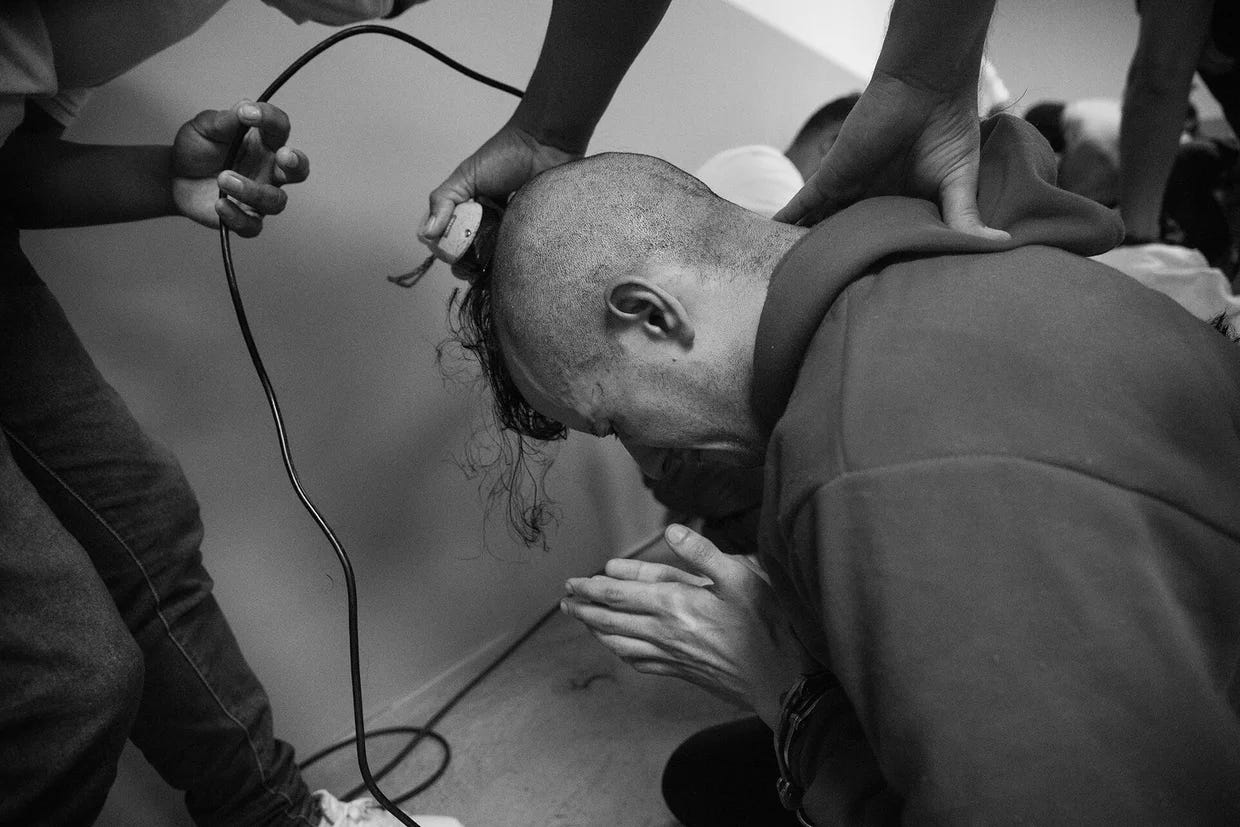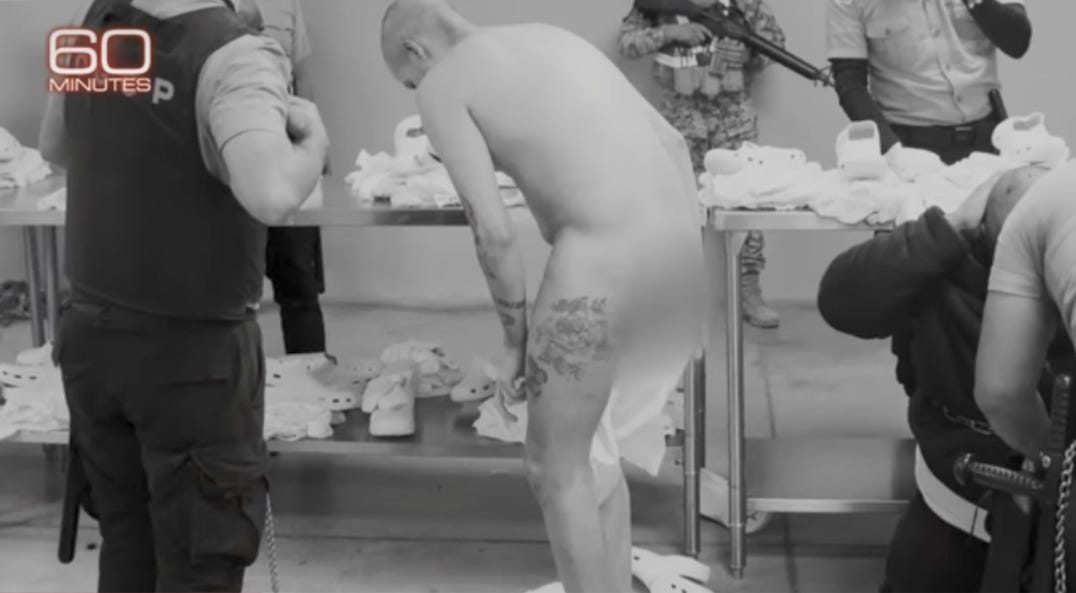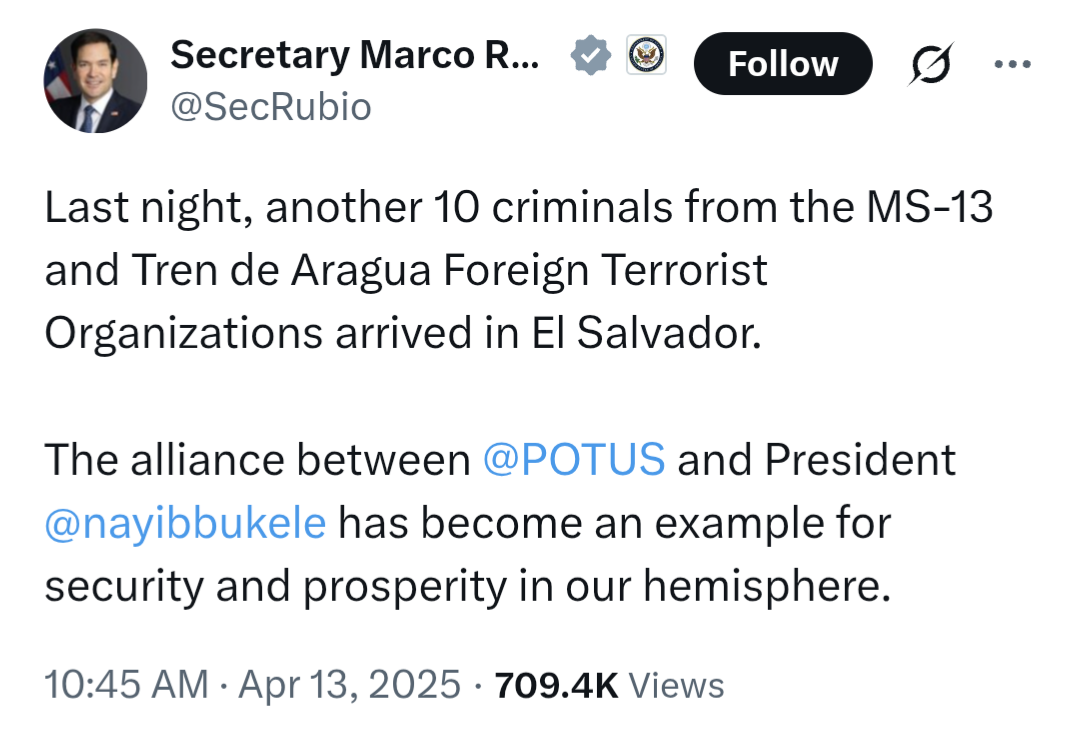Crucified at CECOT: Trump’s Betrayal of the Stranger and Christian Love
The Trump administration deported hundreds for generic tattoos and Chicago Bulls attire. This Easter, their suffering exposes America’s legal, ethical, and spiritual crisis.
This Sunday, while millions of Christians celebrate Easter—the triumph of love over state-sanctioned persecution—hundreds of men will endure another day humiliatingly hung upon the cross of CECOT, El Salvador’s detention center. Condemned without trial by the Trump administration, they languish in undated incarceration, entombed in a morally desolate dungeon where detainees live in a human warehouse akin to a factory farm and are denied all contact with the outside world including legal counsel, friends, and family.
CECOT is a terra nullius—a no man’s land—where the presumption of innocence, the possibility of redemption, and the Christian obligation to love one’s enemies do not exist. For the men of CECOT, Easter will not be a day of joyous celebration but another 24-hours of unjustly denied deliverance.

Condemned to Crucifixion at CECOT
On Saturday, April 13, Secretary of State Marco Rubio announced via X that the U.S. government sent another group of men to El Salvador's luminous dungeon on April 12, 2025. This brings the total men sent to the maximum security prison known as CECOT to around 300.
On March 16, 2025, the Trump administration sent 261 men to CECOT. They were deprived of any opportunity to challenge the executive branch’s decision to deport them to a third-party nation. According to a report by 60 Minutes, 75% of the men have no criminal record. Only 5% have violent criminal records.
Internal documents reveal that the government has relied on specious “evidence” to determine the men’s alleged gang affiliation. This so-called evidence includes displaying hand signs, having generic tattoos—crowns, clocks, trains, and stars—and wearing generic apparel featuring the logo of the Chicago Bulls basketball team or the iconic basketball player, Michael Jordan’s popular Jumpman logo.
The government’s CECOT deportation rubric: Crown tattoo + 4pts. Chicago Bulls attire + 4pts = 8pts a one way trip to CECOT
Many of those deported to the dystopian CECOT facility entered the United States through legal ports of entry and were actively engaged in the process of establishing their residency, citizenship, or asylum. U.S. citizen and resident of Texas, Angie González’s husband, Jesús Alberto Ríos Andrade, was arrested the day before his scheduled immigration check-in. Andry Hernández Romero, a gay makeup artist, was engaged in the process of seeking asylum and had completed a credible fear interview.
Beyond denying moral concern to asylum seekers, the U.S. government is actively subjecting men like Hernández to the kinds of indignities they intended to escape by coming to the United States. This wrong of denying humanity to the asylum seeker ought to be of particular concern to those whose savior himself was a refugee. For Jesus’ family fled Judea to Egypt to escape the persecution of King Herod.
Perhaps it was this experience, in part, that led Jesus to adopt a vision of the human family that repudiated conventional social classifications. For while many who today identify with Christianity and Jesus speak of “America First,” Jesus called for his followers to reject identities based on geographic locations or states in favor of a universal brotherhood. As the New Testament scholar, John Dominic Crossan wrote,
“Neither Jesus nor his followers are supposed to settle down in one place and establish there a brokered presence…. for Jesus, the Kingdom of God is a community of radical or unbrokered equality in which individuals are in direct contact with one another and with God, unmediated by any established brokers or fixed locations.”1
Jesus embraced and showed love to the other even when they were outcasts. By contrast, the Trump administration is actively persecuting the stranger—the asylum seeker.
As documented in my four-part series, the government’s deportations—more accurately termed disappearances—violate human rights, legal standards, reason, and the inviolable principle of presuming the innocence of the accused.
An essential characteristic of the non-authoritarian state is the presumption of innocence. As discussed in part four, this ancient ethical value and legal principle was cemented into U.S. law in the 1895 Supreme Court case, Coffin v. United States. The unanimous ruling stated:
“The principle that there is a presumption of innocence in favor of the accused is the undoubted law, axiomatic and elementary, and its enforcement lies at the foundation of the administration of our criminal law.”
When a state permits its executive branch to presume someone’s guilt and issue unchallengeable, life-shattering judgments against those persons, the rule of law and the balance of powers are rendered inoperative. And a society is not free if the mechanisms that hold power to account are ineffectual.
Don’t indulge despair. Let the truth inspire action.
1️⃣ Like❤️ 2️⃣ Comment 3️⃣ ♻️ Repost/Share Widely 4️⃣ Contact Elected Officials (sample script at the end)
Disappearing Kilmar Abrego Garcia
Kilmar Abrego Garcia is one of the men swept up in the Trump administration’s disappearance program. Not only is Garcia married to a U.S. citizen, but he is also a legal resident of Maryland. In 2019, an immigration judge ruled that Garcia was protected from deportation to El Salvador where he was likely to endure persecution from gangs. Despite his legally mandated protection, Garcia was arrested by Homeland Security agents as he drove home from his sheet metal job having just picked up his 5 year old child. The agents told him his status had “changed.”
The U.S. government later admitted that they were aware of Garcia's protection from removal to El Salvador but claimed he was deported anyway due to “administrative error.” Since then the Supreme Court concluded the administration must “facilitate” the return of Garcia. But the officials within the government have indicated they will make no such effort. U.S. Attorney General Pam Bondi told Fox News that Garcia “is not coming back to our country.”
Read more about Garcia’s case in part one, “Deported by Fallacy: ICE's Cruel Circular Logic for Sending Hundreds to a Brutal Salvadoran Prison”.
In legal filings, the Trump administration has insisted that it is not obligated to assist in returning the Maryland resident from the Salvadoran prison the administration mistakenly sent him to. On April 13, The Guardian reported, “Attorneys for the Trump administration said the high court’s order to ‘facilitate’ the return of Abrego García, 29, meant they should ‘remove any domestic obstacles that would otherwise impede the alien’s ability to return here, not help extract him from El Salvador.’” The administration’s refusal to secure Garcia’s release includes refusing to withhold payment for his incarceration—the U.S. is paying $6 million for the carceral services—or to simply ask El Salvador’s President to return him.
Want to help Humanities in Revolt grow? Leave a tip to spread the humanistic revolution far and wide!
1️⃣ Subscribe (free) 2️⃣ Support: Become a paid subscriber or leave a tip
A Sophist Pretending to be a Philosopher King
Garcia’s fate and the Trump administration’s wider Salvadoran “deportation” program was raised during El Salvador’s President Nayib Bukele’s visit to the White House on April 14, 2025. When asked if he would return Garcia, President Bukele, who previously described himself as the “world’s coolest dictator,” said he could not return Garcia.
“How can I return him to the United States? I smuggle him into the United States? The question is preposterous. How can I smuggle a terrorist into the United States? I don't have the power to return him to the United States.”
When asked if he would consider releasing Garcia in El Salvador, Bukele said his country is “not very fond of releasing terrorists.”
Though Bukele has previously called himself a “philosopher king,” his comments about Garcia reveal a sophist rather than a lover of wisdom. In defiance of Socratic principle, Bukele attacked a strawman line of questioning that no one advanced, turning the question on the questioner. How can he “smuggle” a “terrorist” into the United States?, he asked. A thinking person might expect Bukele to simply ask the President and his staff, whom he was sitting beside, to arrange to receive the man the United States is paying to be incarcerated.
Equally absurd: Bukele’s insistence that Garcia is a “terrorist.” The “charges” against Garcia are no more compelling than the charges that led Pontius Pilate to condemn Jesus to death. To date, Garcia has not been convicted of any crime in a court of law. And freedom loving people presume innocence until guilt has been proven. If Garcia is indeed a criminal deserving of legal consequence, those convinced of his guilt ought to prosecute him in an fair and objective legal venue. Though figures in the Trump administration have repeatedly claimed Garcia is a member of the MS-13 gang, this allegation rests upon an unidentified confidential informant and officers’ contention that his “Chicago Bulls hat” and “hoodie” were indicative of his membership in the gang.
Following Bukele’s fallacious lead, President Trump deployed a trio of faulty appeals in mocking the idea that Garcia should be released. By extension Trump mocked the U.S. judiciary’s judgment concluding that since Garcia is guilty of no crime and the U.S. government illegally removed him, that he must be returned. Referring to the press, Trump said, “They'd love to have a criminal released into our country. These are sick people.”
In his response, Trump weaponized emotionally laden language meant to whip up fears of releasing dangerous persons into the community. In doing so he also assumed the guilt of a man who has not yet been found guilty of any crime. Instead of addressing the question or challenging its premise, Trump levied an ad hominem or personal attack against those who dared to question his executive authority.
In sum, the two men—one who previously called himself a dictator and another who implied he was a king—made clear they reject the Christian dictate to love one’s enemies. Furthermore, they showed disregard for the ancient principle of presuming innocence until proven guilty, rejecting any external influence over their ultimate and final judgment of the 300 men condemned to CECOT. Thus both men are operating as though endowed with the kingly power to accuse, arrest, and adjudicate guilt, an unambiguously authoritarian ideology.
The Sorrowful Path to CECOT
The same day Secretary of State Marco Rubio announced additional “deportations” to El Salvador via X, he also shared that he and his wife were joining Christians around the world “commemorating the beginning of the Holy Week” and celebrating Jesus’ “triumphant entrance into Jerusalem this Palm Sunday.”
There is bitter irony in the two announcements, the second honoring the start of a Christian holiday culminating in the celebration of Resurrection Sunday—Easter. While the American legal tradition is built upon the presumption of innocence, the radical Christian tradition, begun by Jesus, insists on loving and forgiving precisely those most difficult to love—one’s enemy.
Jesus went beyond the Socratic and Stoic dictates never to return harm for harm; Jesus declared loving one’s enemies the central requirement of his followers. He directly repudiated the principle of talion dictating eye for eye, and commanded his followers to embrace their enemies as siblings, as members of the same family.
No longer are we to only embrace our neighbors and “hate” our enemies. Jesus’ followers must “love” their “enemies.”
“If you love those who love you, what credit is that to you? Even sinners love those who love them. And if you do good to those who are good to you, what credit is that to you? Even sinners do that….But love your enemies, do good to them, and lend to them without expecting to get anything back. Then your reward will be great, and you will be children of the Most High because he is kind to the ungrateful and wicked. Be merciful, just as your Father is merciful” (6:32-36).
Even as Jesus is crucified he sympathizes with his persecutors and executioners: “Father, forgive them, for they do not know what they are doing.” In other words, Jesus extends moral concern for even those who are most rightly deemed criminals.
But Andry Hernández Romero is not a criminal. The painful irony of Rubio’s commemoration of the Christian Holy Week is that the tattoos cited by immigration officials as indicators of gang membership were meant to honor his Christian faith. The crown tattoos signified the Three Kings Day festival so widely celebrated in his Venezuelan hometown. The January 6th holiday commemorates the day the three wise men visited and brought gifts to baby Jesus.
Learn more about the Trump administration’s implementation of the Alien Enemies Act and the dystopian character of CECOT in part three: “Deported to Dystopia…”
It is only fitting, therefore, to consider Hernández’s anguish in the context of his faith and the Christian Holy Week. Before his crucifixion, Jesus walked what has been called the Via Dolorosa—the sorrowful path—in which he was treated contemptuously and mocked by observers and law enforcers. Accused of blasphemy against the prevailing religious order, Jesus was mocked with a crown of thorns, beaten in the head, and stripped naked before being nailed to the cross.
Charged with being a violent gang member, Hernández was arrested, taken to a distant land in the dark of night, and paraded through a gauntlet of menacing soldiers. Photojournalist Philip Holsinger witnessed his sorrowful journey from U.S. plane to CECOT inmate. Hernández cried out that he was innocent. Physical violence against his body was the soldiers’ collective reply.
Rather than forced to wear a crown of thorns, Hernández was forced to endure a rushed forced shaving of his head. The goal of buzzing the men’s hair was as much about humiliation and dominance as hygiene. This is clear from the fact that Holsinger noted many of the men were left with patches of uncut hair. As he said, “they intentionally want them to feel that they're powerless.”

Hernández’s “crime” was having tattoos honoring the Three Kings. Tap ♥️ to boost visibility and share with others.
Before dying on the cross, the Gospel of Mark tells us that Jesus cried out, “My God, my God, why have you forsaken me?” Holsinger’s camera lens witnessed Hernández’s desperate pleas of innocence become poignant prayers to God and his mother. Already forlorn by humanity, we are left to wonder whether or not Hernández felt equally abandoned by God.

Read more about Hernández’s story and the ancient principle of presuming innocence in part four: “CECOT and the Unquelled Cry of the Innocent…”
Hernández endured more Christ-like humiliation when he was forced to strip naked before armed guards—his body, like his humanity, laid bare. In witnessing such violations of human dignity, we feel the same disorienting remorse evoked by Georges Rouault’s etching, That Ye Love One Another: Jesus’ gaunt frame, arms forcibly wrenched wide in the torturer’s parody of jubilation; his head limply fallen to his own shoulder while his darkened eyes cast the shadow of moral judgment upon the onlooker—upon us. The question is not whether we can see the violations and suffering before us. The question is whether our shame will invigorate our courage to respond or expedite our flight to moral indifference. Will we, at last, refuse to be complicit in the political-social systems that crucify the innocent, today?
Jesus’ Solidarity with the Criminal and Oppressed
Some may take offense to comparing the suffering the men disappeared into the bowels of a distant land’s dungeon to that of Jesus. Yet such offense would be born of ignorance about the deeper significance of the Jesus story.
The poignance of Jesus’ death upon the cross is realized, in large part, by grasping the commonality of crucifixion in antiquity. As historian and New Testament scholar, Martin Hengel explained, crucifixion was a “widespread” form of punishment used against “the lower classes, i.e., slaves, violent criminals, and the unruly elements in rebellious provinces, not least in Judaea.” That the punishment was not particularly unique is evidenced by the fact Jesus was crucified along with two other criminals. That Jesus would be held up as the son of God despite being ignobly and pathetically “executed in the prime of his life by the worst of deaths” struck Roman elites as particularly preposterous.
Those with power and privilege in the Roman world believed Jesus’ crucifixion made him worthy of scorn, not worship. Crucifixion was used by authorities for its supposed “supreme efficacy as a deterrent.” The condemned were stripped naked, painfully hammered to wood, and humiliatingly displayed for all to see the fate that awaited them should they dare to violate the reigning authority’s whims.
More than holding the individual “criminal” to account, Roman authorities used crucifixion as a spectacle to substantiate their dominance and strike terror into those whom they intended to keep powerless.
Today, the Trump administration and the Salvadoran government are using the terror-inducing spectacle of disappearance into CECOT to achieve the same goal of the crucifixion: deterrence of alleged “crime.” U.S. Homeland Security Secretary, Kristi Noem, traveled to the detention center where she delivered a video recorded message standing in front of a cell packed with men. After the men were ordered to remove their face masks and shirts, Noem said those who “come to our country illegally, this is one of the consequences you could face.” Given that many of the men sent by the Trump administration entered through legal ports of entry, the warning must be understood to broadly apply to anyone who enters the United States whom the government does not favor.
Support Humanities in Revolt: Upgrade to a Paid Subscription.
As those familiar with global religion know, Jesus’ story was not unique because of his claim of divine parentage nor resurrection. As the early Christian, Justin Martyr admitted in his First Apology, these claims were made of others before Jesus. It was the “indecency” of Jesus’ lowly path and his identification with the “lowest” in society that stood out. He was deemed a “criminal” by those with authority and he embraced the most marginalized in society including women, the disabled, the ostracized “lepper,” and the destitute—the beggar.2
Jesus’ death upon the cross, as Hengel explained, “demonstrated the ‘solidarity’ of the love of God with the unspeakable suffering of those who were tortured and put to death by human cruelty.” Those who comprehend the unspeakable humiliation and suffering presently endured by the men condemned to CECOT cannot help but to also recognize their torment as a symbolic crucifixion of our time.
Crucified at CECOT for Our Sins
Good Friday offers us an opportunity to ponder our commitment to love and solidarity. It also invites us to bear witness rather than look away as our brethren including Hernández endure suffering and forced “crucifixion.” The sufferers’ geographical location and ethnic identity are trivial details for those who take seriously the dictate to show no favoritism in determining moral worth. Whether they suffer as Palestinians in Gaza, where the death toll has surpassed 50,000, or as Venezuelans and Salvadorans in CECOT, their suffering is worthy of our concern. And for what reason do the hundreds disappeared to CECOT suffer? The sins and hubris of the Trump administration and the ignorance of a nation that has lost its moral compass or is failing to exercise responsible self-governance.
The wider American public can no longer ignore this crisis in democracy and ethics, a crisis as spiritual as it is political. During his meeting with Bukele, President Trump said he told El Salvador’s president that the “home growns are next,” indicating that he would like to send U.S. citizens deemed “criminals” to CECOT. Trump said he wanted to get as “many as we can get out of our country.” He also told Bukele that CECOT isn’t “big enough” and he needs to “build about five more places.”
Already, a U.S. citizen, Juan Carlos Lopez-Gomez, was arrested and placed in a county jail for allegedly entering Florida illegally as an “unauthorized alien.” Leon County Judge LaShawn Riggans determined Lopez-Gomez’s birth certificate was authentic making the stated probable cause for arresting the 20 year old invalid. Yet the man was not immediately released because he was in the custody of U.S. Immigration and Customs Enforcement (ICE), and the judge said she lacked jurisdiction over the federal agency.
President Trump’s government has disappeared hundreds of immigrants without charge and for the offense of having crown tattoos and wearing Chicago Bulls branded clothing. What reason do U.S. citizens have for believing their guilt would be adjudicated any less unjustly? The President’s Deputy Assistant, Sebastian Gorka has said those arguing against Trump’s deportations were “on the side of the cartel members…the illegal aliens, on the side of the terrorists.” Gorka, the administration’s Senior Director for Counterterrorism, went still further suggesting opponents of the administration’s policy of sending people to El Salvador without due process might be considered to be “aiding and abetting criminals and terrorists.”
This Easter, as Christians celebrate resurrection, the men of CECOT will remain entombed—not by stone, but by a state that has chosen the idolatry of brute executive force over reason, due process, and ethical principle. We might initiate their deliverance by turning perfunctory holiday celebrations into serious contemplation of the overlooked lesson offered by Jesus’ experience.
Jesus exemplified a subversive “heroism” that exchanged superiority, violence and egoism for solidarity, nonviolence, and love. Jesus also offers a model of uncompromising opposition to authoritarian power-as-force. In dying upon the cross, he joined Socrates in deciding that the avoidance of death—the prioritization of physical security at the expense of all else—was too great a compromise.
There is much blame to lay at the feet of political authority, but it is time to consider how our lack of courage and moral integrity—a refusal to trade an ounce of pretended security for a pound of inviolable principle—helped plot the sorrowful course hundreds of men have been forced to walk from the “land of the free” to El Salvador’s dungeon.
1️⃣ Like❤️ 2️⃣ Comment 3️⃣ ♻️ Repost/Share Widely 4️⃣ Contact Elected Officials (sample script at the end) 5️⃣ Subscribe (free) 6️⃣ Support: upgrade to a paid subscription or leave a tip
Sample script: “I’m calling to demand immediate action to stop the Trump administration’s unlawful deportations to El Salvador’s CECOT prison. Over 300 men—including asylum seekers and legal residents—have been disappeared without due process. Internal documents show the government deports people for wearing sports jerseys or having tattoos. The U.S. is even paying $6 million to fund this abuse. This Easter week, I urge [Rep/Senator] to:
1. Publicly condemn these deportations as human rights violations.
2. Introduce legislation to block funding for CECOT and mandate oversight hearings.
3. Demand the DOJ investigate ICE’s use of gang ‘evidence’ like tattoos and basketball jerseys.
See “In the Beginning Is the Body,” in Jesus: A Revolutionary Biography (1995).
See John Dominic Crossan’s explanation of why “poor” as in “Blessed are the poor, for yours is the kingdom of heaven” is best interpreted as “destitute,” meaning that Jesus is here referencing not those who are subsisting but those utterly lacking of their most basic human needs. “A Kingdom of Nuisances and Nobodies,” in Jesus: A Revolutionary Biography (1995).









Such an important message for all of us. Thank you! Being German I am unfortunately only too familiar with the concept of grabbing people off the streets, dehumanising and deporting them to places of no return....
I know the comparison is flawed, but the similarities give me great pause and do frighten me.
Concentration camps have arrived